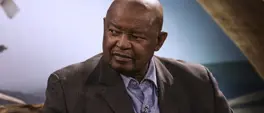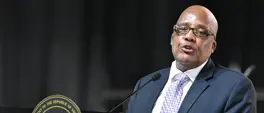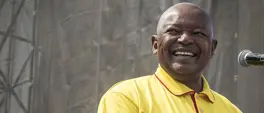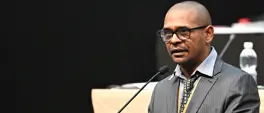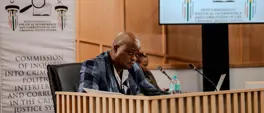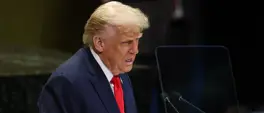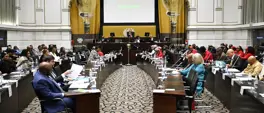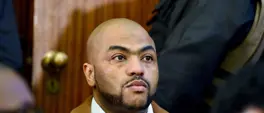CHARLES MATSEKE | South Africa’s quiet privatisation and the birth of an Oligopoly
Charles Matseke
15 October 2025 | 14:59"Unless citizens, journalists, and institutions recover the courage to confront this creeping oligopoly, history will record that the Republic did not collapse it was quietly privatised."
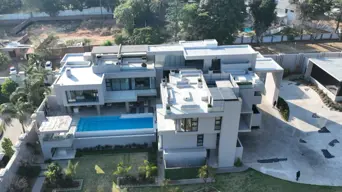
The SIU confirmed it is conducting two simultaneous raids in different provinces, targeting properties belonging to Tembisa Hospital tender mogul Hangwani Maumela. Picture:@RSASIU/X.
When Cyril Ramaphosa rose to the ANC presidency in December 2017, he promised a “New Dawn.”
After the scorched earth of the Zuma years, he styled himself as the rebuilder the clean-handed constitutionalist who would restore South Africa’s moral compass. The nation, exhausted by scandal, wanted to believe him. “Thuma Mina,” he said.
Eight years later, the promise of moral restoration has collapsed into moral insolvency. Worse still, South Africa is drifting toward an oligopoly a system in which power is no longer captured by one corrupt faction but shared, inherited and recycled among the elites, the ultra-elites, and corporate oligarchs who now sit comfortably behind the president’s polished smile.
Ramaphosa’s 2017–2019 campaign was a masterclass in moral marketing. He vowed to end corruption, restore investor confidence, and re-establish integrity in the ANC.
Eloquence became his armour, language so refined it concealed the continuity of the very networks he promised to dismantle.
During Zuma’s tenure, South Africa endured its most openly corruptyears of presidency blown by scandal after scandal. Under Ramaphosa, the scandals are equally rampant, but the form has changed: corruption is now corporatised.
The state is being absorbed into an oligopoly, where policy, procurement, and even justice rotate within a small circle of political-corporate inheritors. What was once state capture has matured into state inheritance.
In 2021, Ramaphosa unveiled the “step-aside” rule, obliging charged ANC members to vacate office. It looked like reform; it functioned like selective amnesty. Those outside his camp were purged; those within were promoted. The rule’s uneven enforcement revealed an oligarchic instinct: protect the core, sacrifice the expendable.
The deeper truth was that the president could not cleanse what he depended on.
His own political ascent was financed and endorsed by South Africa’s corporate aristocracy the same conglomerates that now shape economic policy through back channels, boardrooms, and foundations.
By 2022, the Phala Phala scandal shattered the illusion of ethical leadership. Millions of undeclared U.S. dollars hidden in furniture at the president’s private farm exposed not only personal secrecy but systemic privilege.
Ramaphosa’s shifting explanations of theft, negligence, conspiracy signalled a man accountable only to his class, not his country.
What we learned from Phala Phala is that Ramaphosa governs like a shareholder, not a statesman. Confidentiality replaces transparency; boardroom discretion replaces democratic accountability.
The line between private capital and public office has vanished a defining feature of oligopoly.
Then came the Hangwani Maumela affair. The scandal that, perhaps unintentionally, illuminated the entire oligarchic design.
For over two years, both the presidency and Ramaphosa personally denied any association with Maumela, the businessman now under SIU investigation for the Tembisa Hospital contracts that whistle-blower Babita Deokaran died exposing.
Only now, after SIU raids on Maumela’s Sandton mansion where luxury cars and art worth nearly R820 million were seized did Ramaphosa speak.
His statement on the SABC was a masterpiece of moral minimalism: “I have no personal or business relationship with Mr Maumela, apart from a decades-old marriage link.”
This selective truth-telling betrays a familiar pattern: speak only when silence becomes impossible. The opportunity cost of two years of denial is the erosion of public trust.
Worse, his narrow focus on Maumela’s “aunt connection” conveniently sidestepped questions about other implicated associates such as Matlatla and the mysterious disbanding of the Political Killings Task Team (PKTT).
Ramaphosa’s omissions are not accidental. They protect a system in which elites investigate one another just enough to maintain the illusion of law while safeguarding the architecture of profit and patronage beneath it.
Ramaphosa’s presidency is defined by an inner circle that mirrors the very oligarchic fusion he denies. Corporate lobbyists draft policy frameworks; ministers sit on boards that contract with the state; advisors double as consultants for firms benefitting from public tenders. The revolving door between government and business has never spun faster.
During Zuma, corruption was chaotic’ a scramble for rents. Under Ramaphosa, corruption is orderly, a structured economy of privilege managed through the language of reform. South Africa is no longer captured; it is curated.
The disbandment of specialized units such as the PKTT and the politicization of senior SAPS appointments demonstrate how control is being centralised. Law enforcement now serves to protect elite consensus rather than challenge it.
Ramaphosa’s genius lies in his performance. He remains the blue-eyed boy of white monopoly capital and global investors, a man who speaks softly about ethics while insulating oligarchic interests from democratic scrutiny.
Each new scandal follows the same script: a measured statement, a task team, a promise of reform, then silence. The repetition is deliberate. Moral fatigue breeds submission. By exhausting public outrage, Ramaphosa has normalised corruption through ritualised contrition.
The New Dawn has become a corporate dusk, where accountability is managed through public-relations cycles rather than institutional courage.
Yet Ramaphosa’s moral insolvency thrives because society allows it. The media, once fearless during Zuma’s time, has grown timid louder on spectacle, quieter on structure. Instead of mapping the oligopoly’s web from conglomerate funding to procurement cartels many outlets chase surface scandal. Opposition parties issue press statements but avoid systemic confrontation. Citizens, fatigued by the repetition of deceit, accept dishonesty as administrative normality.
This is South Africa’s collective guilt: the normalization of elite rule through democratic language. The republic has become a stage where everyone performs integrity while trading favours backstage.
The tragedy of Cyril Ramaphosa is not simply his failure to keep promises; it is his success in convincing South Africans that eloquence equals ethics.
Under his watch, the presidency has evolved into an oligarchic boardroom accountable upward to capital, notoutward to citizens.
South Africa no longer suffers from state capture; it endures state inheritance the passing of power from one network of elites to another. The Zuma years were brazen; the Ramaphosa years are sophisticated. But both are bound by the same moral denominator: the commodification of governance.
Unless citizens, journalists, and institutions recover the courage to confront this creeping oligopoly, history will record that the Republic did not collapse it was quietly privatised.
The “New Dawn” has dimmed into permanent dusk a nation governed by gentlemen thieves with good grammar.
Get the whole picture 💡
Take a look at the topic timeline for all related articles.
Trending News
More in Opinion
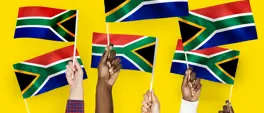
3 March 2026 11:40
Who belongs in South Africa? UCT philosopher weighs in on identity and ownership
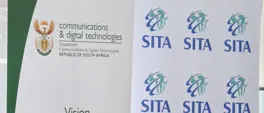
2 March 2026 11:05
TLALI TLALI |Mandate, money and accountability - What the government website debate really reveals

27 February 2026 11:00
JAMIL F. KHAN | Human rights last on the list for global leadership agenda
